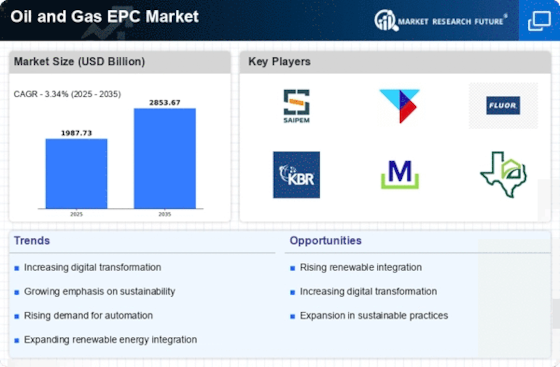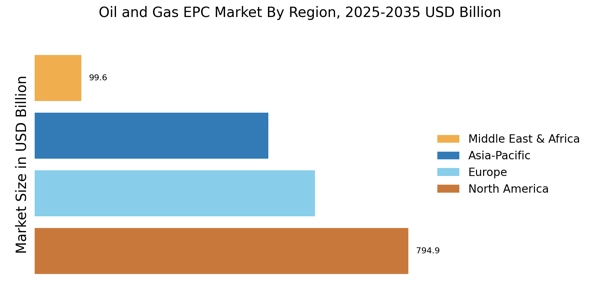Geopolitical Factors
Geopolitical factors are pivotal in shaping the Oil and Gas EPC Market. Political stability, trade relations, and international conflicts can significantly impact oil and gas production and distribution. For instance, tensions in oil-rich regions often lead to fluctuations in oil prices, which can affect investment decisions in the EPC sector. Additionally, changes in government policies regarding energy resources can create new opportunities or challenges for EPC firms. The Oil and Gas EPC Market must navigate these complexities, as geopolitical dynamics can influence project viability and timelines. Firms that are adept at understanding and responding to these factors are likely to thrive in an increasingly interconnected and uncertain environment.
Rising Energy Demand
The increasing The Oil and Gas EPC Industry. As economies expand and populations grow, the need for energy sources intensifies. According to recent estimates, global energy consumption is projected to rise by approximately 30% by 2040. This surge necessitates the development of new oil and gas projects, thereby creating opportunities for engineering, procurement, and construction (EPC) firms. The Oil and Gas EPC Market is likely to benefit from this trend as companies seek to enhance their production capabilities and infrastructure to meet the escalating demand. Furthermore, the transition towards cleaner energy sources may also influence the types of projects undertaken, pushing EPC firms to innovate and adapt their services accordingly.
Regulatory Frameworks
Regulatory frameworks significantly influence the Oil and Gas EPC Market. Governments worldwide are implementing stricter regulations aimed at environmental protection and safety standards. These regulations often necessitate the involvement of EPC firms to ensure compliance during project execution. The need for environmental assessments, safety audits, and adherence to local laws can increase project complexity, thereby enhancing the demand for specialized EPC services. Moreover, as countries strive to meet international climate commitments, the Oil and Gas EPC Market may witness a shift towards more sustainable practices. This evolving regulatory landscape presents both challenges and opportunities for EPC firms, as they must adapt to new requirements while continuing to deliver efficient solutions.
Technological Advancements
Technological advancements play a crucial role in shaping the Oil and Gas EPC Market. Innovations in drilling techniques, such as horizontal drilling and hydraulic fracturing, have revolutionized the extraction processes, making them more efficient and cost-effective. The integration of digital technologies, including artificial intelligence and data analytics, enhances project management and operational efficiency. As per industry reports, the adoption of advanced technologies could potentially reduce project costs by up to 20%. This trend not only streamlines operations but also improves safety and environmental compliance, which are paramount in the oil and gas sector. Consequently, EPC firms that leverage these technologies are likely to gain a competitive edge in the market.
Investment in Infrastructure
Investment in infrastructure development is a significant driver for the Oil and Gas EPC Market. Governments and private entities are increasingly allocating funds towards building and upgrading oil and gas facilities, pipelines, and refineries. For instance, the International Energy Agency indicates that investments in oil and gas infrastructure could reach trillions of dollars over the next decade. This influx of capital is expected to stimulate demand for EPC services, as companies require expertise in managing large-scale projects. Additionally, the focus on enhancing energy security and reducing supply chain vulnerabilities further propels infrastructure investments. As a result, the Oil and Gas EPC Market stands to gain from these ongoing developments.

















